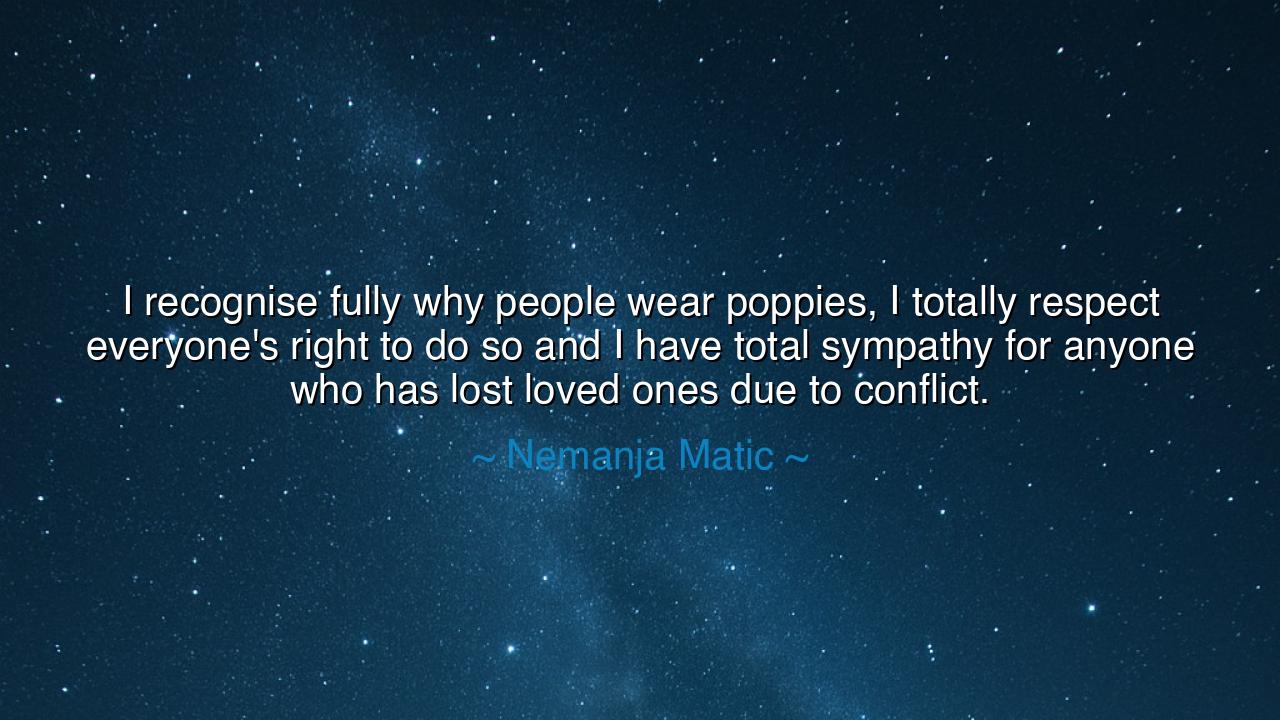
I recognise fully why people wear poppies, I totally respect
I recognise fully why people wear poppies, I totally respect everyone's right to do so and I have total sympathy for anyone who has lost loved ones due to conflict.






Hear, O children of memory, the solemn words of Nemanja Matic, who once declared: “I recognise fully why people wear poppies, I totally respect everyone’s right to do so and I have total sympathy for anyone who has lost loved ones due to conflict.” Though spoken with simplicity, these words shine with the dignity of remembrance, for they speak not of glory in battle, but of reverence for sacrifice and of sympathy for sorrow. They echo the timeless human duty: to honor the fallen, to comfort the grieving, and to preserve the truth that war is a burden borne by both the dead and the living.
The poppy, small and fragile, has become a symbol of immense weight. Its origin lies in the fields of Flanders, where blood was shed in rivers during the First World War. Amidst the mud and ruin, the poppy bloomed defiantly, crimson as though nourished by the very sacrifice of soldiers who lay beneath. From that time, it became the emblem of remembrance: a flower that whispers of both fragility and resilience, a sign that life persists even amidst devastation. Matic, in speaking of the poppy, calls to mind this legacy, recognizing its deep roots in collective memory.
But he speaks with care, for he also acknowledges the complexity of history. His homeland, scarred by conflict in the Balkans, knows too well the wounds of war that endure long after the guns are silenced. Thus, when he says he respects everyone’s right to wear the poppy, he reminds us that remembrance must not be forced nor made into spectacle. True honor lies in the freedom of conscience, in allowing each soul to remember—or to mourn—in the manner it deems sacred. Respect, then, becomes as vital as remembrance itself.
Consider, as an example, the grief of the mothers of Srebrenica. They lost sons and husbands in the wars of the 1990s, and though no poppy is tied to their mourning, their pain is no less profound. They too gather each year to remember, to speak the names of the dead, to refuse silence. Their grief binds them not to bitterness, but to testimony, ensuring that the world does not forget. Just as the poppy is a symbol in one land, so are white scarves, candles, and prayers in others. The forms differ, but the principle remains: honor the dead, comfort the living, preserve the truth.
Matic’s words also reveal the power of sympathy. He says he has “total sympathy” for all who have lost loved ones. Sympathy is more than pity—it is the act of carrying another’s sorrow within your own heart. It is the recognition that grief is not isolated, but shared. When one life is lost in war, a whole web of families, friends, and communities feels the tearing. To extend sympathy, as Matic does, is to refuse indifference. It is to declare that another’s pain matters, that it echoes across borders and generations.
Let the lesson, then, be this: remember, respect, and sympathize. Do not forget the sacrifices of those who came before, whether in your own nation or in lands far away. Do not judge too quickly how another chooses to mourn, for remembrance is sacred and deeply personal. And when you see one who suffers from loss, do not pass by in silence, but extend words or actions of comfort. For remembrance is not only an act of the past, but a duty to the living present.
What, then, should you do in your daily life? Wear your symbols of memory with sincerity, not with vanity. Learn the stories of those who suffered before you, that you may guard against repeating their fate. When you encounter those whose grief is fresh, stand with them—not only in word, but in deed: offer presence, kindness, and support. And above all, cultivate peace in your speech, your actions, and your heart, so that remembrance of war may serve not as fuel for hatred, but as seed for reconciliation.
Thus the poppy, though but a flower, becomes a teacher. And Matic, in his recognition and respect, reminds us of a truth the ancients would affirm: that to remember the dead rightly is to protect the living, and that sympathy across lines of difference is the foundation upon which peace may yet be built. For as long as mankind honors both sacrifice and sorrow, there is hope that the cycle of conflict may, one day, be broken.






AAdministratorAdministrator
Welcome, honored guests. Please leave a comment, we will respond soon